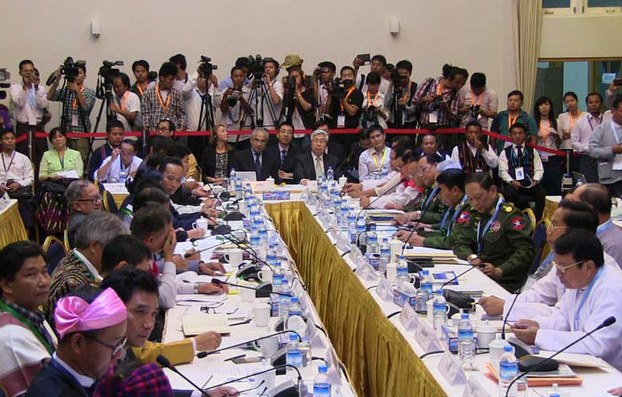Myanmar cease-fire talks chip away at key agenda challenges
| Publisher | Radio Free Asia |
| Publication Date | 20 March 2015 |
| Cite as | Radio Free Asia, Myanmar cease-fire talks chip away at key agenda challenges, 20 March 2015, available at: https://www.refworld.org/docid/552e198653.html [accessed 26 May 2023] |
| Disclaimer | This is not a UNHCR publication. UNHCR is not responsible for, nor does it necessarily endorse, its content. Any views expressed are solely those of the author or publisher and do not necessarily reflect those of UNHCR, the United Nations or its Member States. |
2015-03-20
 Armed ethnic groups meet with government peace negotiators at the Myanmar Peace Center in Yangon, March 17, 2015. RFA
Armed ethnic groups meet with government peace negotiators at the Myanmar Peace Center in Yangon, March 17, 2015. RFA
The fourth day of peace talks between Myanmar government negotiators and armed ethnic groups ended on a positive note Friday in the commercial capital Yangon, with the two sides reaching an agreement on troop deployment and the establishment of a joint monitoring committee.
Salai Lian Hmong Sakhong, a member of the Nationwide Ceasefire Coordination Team (NCCT), which represents 16 armed ethnic groups, said the parties had agreed on five of the seven chapters of a nationwide cease-fire agreement during their negotiations at the Myanmar Peace Center.
"We will set up a joint-monitoring group [and] a committee to discuss union peace, and other committees as needed," he told RFA's Myanmar Service. "If these committees face problems, the ethnic groups which will sign the Nationwide Ceasefire Agreement will solve them by holding meetings."
Government negotiators and leaders from armed ethnic groups began their six-day meeting on Tuesday for the first time since talks to sign an elusive nationwide cease-fire agreement broke down last September. Many of the ethnic armies in the former British colony also known as Burma have been waging on-and-off war with the military-run central government for decades.
The meeting got under way amid clashes between military and armed ethnic troops in Myanmar's northeastern Shan state and northern Kachin state.
NCCT representatives believe an end to fighting is necessary to establish mutual trust in the hopes of hammering out the few remaining points of a fourth cease-fire agreement drafted during the last round of talks, which were stymied by disagreements over military and other issues.
Some of the most contentious issues between the two parties, such as the formation of a federal army and creation of a code of conduct, would not be discussed until political talks held after a ceasefire deal had been reached, the online journal The Irrawaddy reported.
More work needed
Naing Han Thar, leader of the NCCT, said an exact date for the signing of a ceasefire deal could not yet be determined because more work needed to be done.
"There has been progress in the talks, although we can't say what the exact results will be," he said. "We are very close to reaching a final agreement. Both sides explained their opinions on building a federal union, and both sides have to make comments and work to reach a conclusion if we have differences."
He noted that the armed ethnic groups would not agree to abolish the current ethnic armies.
"We think these ethnic armies shouldn't be abolished because the United States has national-guard troops in each state," he said. "If we have state [ethnic] guard troops, they can provide support and protect us from the main army seizing state power."
Aung Min, the minister of the ruling Union government who leads the UPWC, said earlier this week that a firm cease-fire deal would allow the next term of government to continue the peace process through political dialogue following general elections scheduled for later this year.
Reported by Thiha Tun of RFA's Myanmar Service. Translated by Khet Mar. Written in English by Roseanne Gerin.
Link to original story on RFA website
